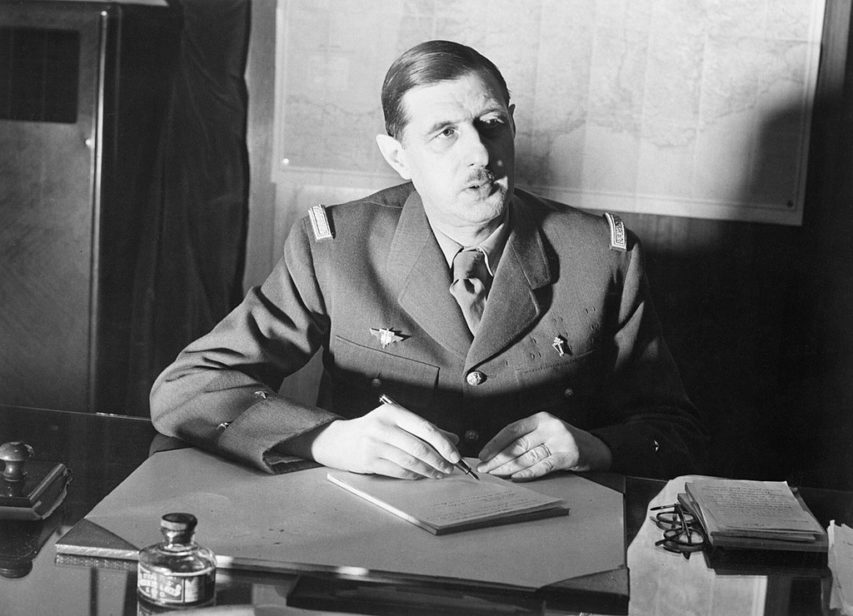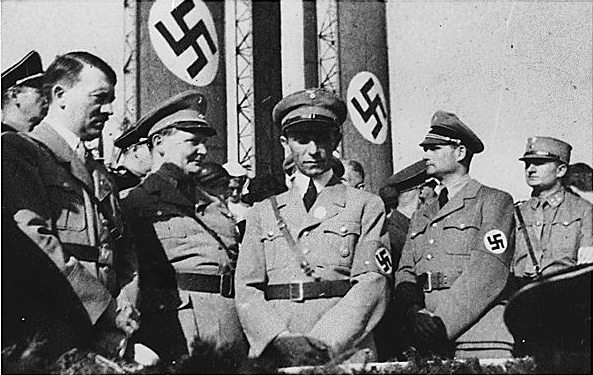Colby Cosh linked to an interesting Peter Hitchens review of a recent biography of Charles De Gaulle (De Gaulle by Julian Jackson):

General Charles de Gaulle, Commander of Free French Forces, seated at his desk in London during the Second World War.
Photo via Wikimedia Commons.
When it came to what de Gaulle thought was the pivotal moment in his life, when he could become virtual monarch of France under conditions chosen wholly by himself, he was as ruthless as Lenin. He had, it is often said, a “certain idea of France.” But the ultra-conservative lawyer, Jacques Isorni, whose clients included the collaborationist Vichy leader Marshal Philippe Pétain and de Gaulle’s would-be assassin, Jean-Marie Bastien-Thiry, concluded that it was “an abstract idea of France, indifferent to the sufferings of the French people.” There is something to this. De Gaulle represented the steely warlike France, summoned up by Bonaparte and again a century later at Verdun, for which the French were required to die and mourn uncomplainingly. For him, Paris was well worth a lie or a betrayal, because his supremacy was so essential for the country he loved.
The costs of de Gaulle’s idea of France were high. As the general himself once mused, “There is no action in which the devil has no part.” The two massacres, and the charnel-house stench which clings to them, are evidence of the reliable rule that even — often especially — the greatest and best of men have terrible flaws and can do terrible things; and also of the other rule that power tends to corrupt. I have begun with them because they are a necessary antidote to the feelings of admiration and liking which any reader of this thrilling, witty, ceaselessly moving, beautifully written account of a truly great man is bound to feel.
Charles de Gaulle’s life would perhaps have been better lived in the seventeenth or eighteenth century, in times when personal courage, mystical imagination, chivalry, and religious fervor were more welcome than they are now. In this world of the United Nations, risk assessment, lawyers, Geneva Conventions, television and superpowers, there is not really enough room for such a man to swing his sword, just as there is no room for old-fashioned great powers in the shadow of superpowers. Had he not been so magnificent, he would have been ridiculous. He looked, more than anything else, like a camel, not least because of the superior expression on his face suggesting that he alone knew the secret One Hundredth Name of God, which camels are supposed to know.
He was filled with shining, old-fashioned beliefs about honor, courage, shame and humiliation, glory and infamy. And as those who conversed with him found, he was perhaps the last great man to make it his business to know those things that it is proper for a king to know. He could talk fluently with philosophers and literary novelists. He had a minute knowledge of history: not just that of France, but of Europe and the world. After many, many conversations with Winston Churchill, a large number of them furious quarrels, he concluded that England’s savior was not in fact very intelligent. He believed wartime, with its austerity and tests of manhood, was more virtuous than peacetime. He believed nothing important could be achieved without recklessness. He stood up to people with considerable courage, even when he was a powerless and lonely figure without soldiers, money, or supporters. He once justified his bloody-minded awkwardness by pointing out that if he were not so difficult, he would himself have been a collaborator. He said “If I were easy to work with, I would be on Marshal Petain’s staff.” He had no time for people like himself. He confessed, “I only esteem those who stand up to me but unfortunately I cannot stand them.”
De Gaulle possessed that great chivalrous virtue of being ready to walk unbowed and defiant in front of the powerful, while being gentle and even submissive to the defenseless and weak. He once became so angry with Churchill that he smashed a chair in his presence to emphasize his rage. Likewise, he defied Franklin Roosevelt over and over again. But he would go home after these battles to sing tender love songs to his daughter Anne, who suffered from Down syndrome. The tiny glimpses we have of this part of his life, obtained from the accidental observations of others, tear at the heart. His concern for Anne was entirely private and not at all feigned. After any long absence from home his first act was to rush up to her room. She died, aged twenty, in his arms. At her funeral, he comforted his wife Yvonne with the words, “Maintenant, elle est comme les autres” (“Now she is like the others”), which must be one of the most moving things said in the whole twentieth century.




